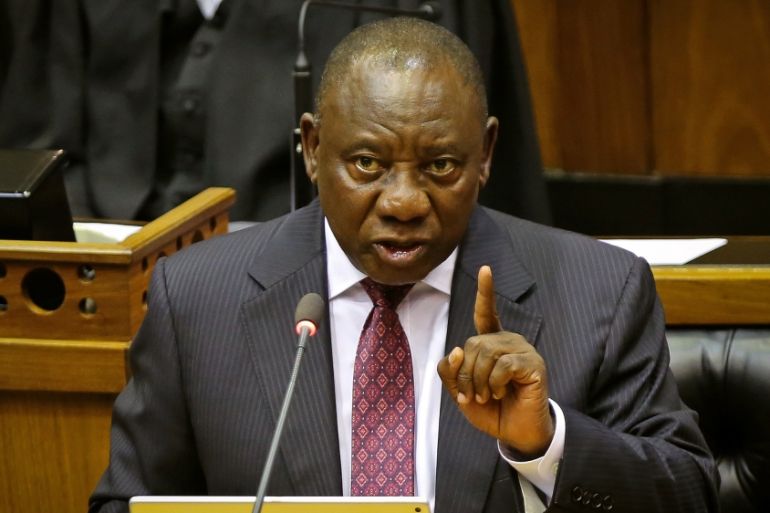Ramaphosa likens anti-migrant attacks to apartheid actions
South African president blasts vigilante groups for attacking African migrants, warns their actions will not be tolerated.

South African President Cyril Ramaphosa has blasted vigilante groups for harassing and attacking migrants, likening their behaviour to strategies adopted by the apartheid regime to target Black people.
Last week, a 43-year-old Zimbabwean man, Elvis Nyathi, was attacked by a mob and set alight by a group of vigilantes searching for foreign nationals in Diepsloot, a township near Johannesburg.
Keep reading
list of 3 itemsSouth African FM: Is Africa facing COVID vaccine apartheid?
S Africa’s Ramaphosa: NATO to blame for Russia’s war in Ukraine
The vigilantes had gone door to door demanding to see people’s identity documents after seven people in the township had been murdered the previous weekend.
On Wednesday, hundreds of residents protested against rising crime rates in Diepsloot, accusing police of failing to contain crime, which they blamed on undocumented immigrants.
“We have seen people being stopped on the street by private citizens and being forced to produce identification to verify their immigration status,” Ramaphosa said in his weekly newsletter on Monday.
“This was how the apartheid oppressors operated.”
“Under apartheid, black people were deemed suspects by default and stopped by police when found in so-called white areas,” he said, referring to the system of oppressive white-minority rule that was abolished in 1994.
Black people “were forced to produce a dompas (a passport-like document that restricted their movements) and if they could not do so, they were jailed.”
Ramaphosa warned that neither the vigilante groups nor politicians inciting local communities to attack foreigners, would be tolerated.
“We cannot allow such injustices to happen again.”
The murder of the seven South Africans in Diepsloot was a tragedy, he said.
“This loss of life is deplorable, as is the killing of a fellow African from Zimbabwe allegedly at the hands of vigilantes,” Ramaphosa said.
But he warned: “Today, our anger may be directed at nationals from Zimbabwe, Mozambique, Nigeria or Pakistan. Tomorrow, our anger may be directed at each other.”
The president warned that scapegoating migrants for poor service delivery, unemployment and crime could ignite xenophobic violence.
“Attacking those we suspect of wrongdoing merely because they are a foreign national is … immoral, racist and criminal. In the end, it will lead to xenophobia,” he said.
Competition for jobs, especially in low-skilled sectors, is also a factor in sharpening anti-immigrant resentment.
South Africa, one of the most unequal countries in the world, is buckling under one of the world’s highest joblessness rates – more than 35 percent of the workforce is unemployed.
Although unrelated to this week’s protests, dozens of protesters in Johannesburg have in recent months been staging demonstrations against undocumented migrants in what they have dubbed Operation Dudula.
Dudula translates to “force out” or “knock down” in the Zulu language, and expresses the common purpose of organisations like it – to force out immigrants from other African countries.
According to Operation Dudula, its campaign is driven by the burden placed on public health services, job opportunities and social grants due to an “influx of illegal immigrants”.